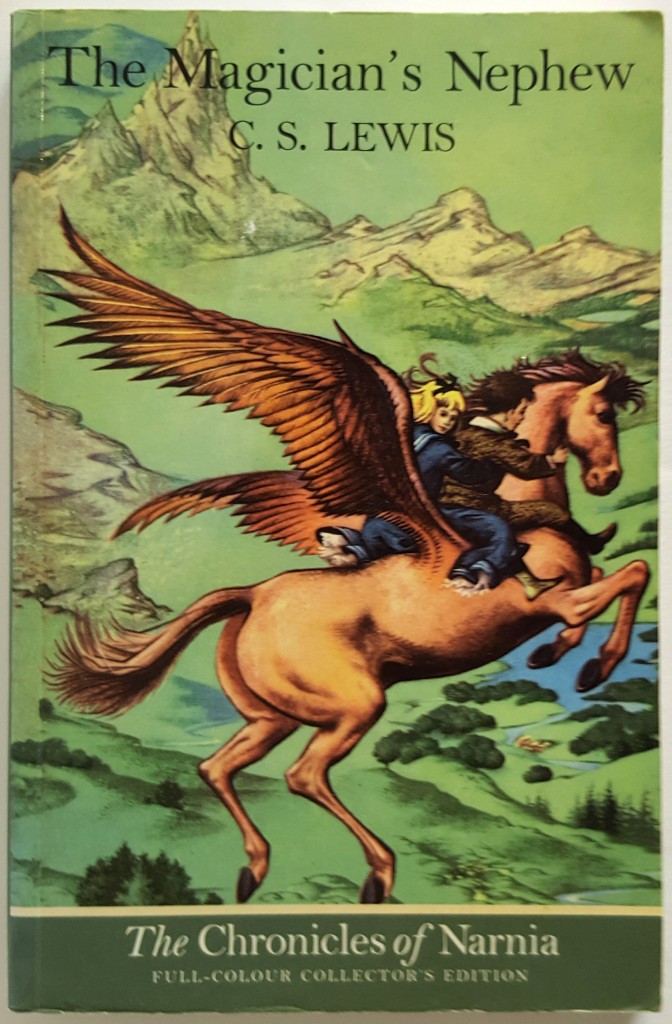 I found myself really enjoying this book, which is first in the story chronology of the Narnia books, but the last to be written. Last month, I read a biography of C. S. Lewis, and the man’s personal life was fresh in my mind. One thing is clear: Lewis despised and resented the British class system as much as George Orwell did, and it comes across strongly in this book. He also shared Orwell’s hatred for his Public School experience. In the character of the Magician, who is mercilessly flayed with sharp little razor-cuts that a child can easily decode, he demonstrates his loathing for the amoral technocrats whom he obviously felt were taking over the world. Lewis and Orwell form an interesting pair to compare. They both wrote scathing denunciations of totalitarianism, both in adult science fiction and children’s fantasy. Yet, by the ideological conventions of the time, they were supposed to be enemies of each other. Orwell wrote rather snidely of Lewis’s radio broadcasts. However, they pretty much feared and opposed the same things. Where Orwell thought he could fight those things with personal honesty and a humane, secular, democratic socialism, Lewis somehow managed to see the same values in a kind of cartoon version of the Church of England. His version of Protestant Christianity will be rather hard for fundamentalist protestants in the United States to deal with, if they examine it closely, and I won’t be surprised if the Narnia films end up causing confusion and disarray among them. Those raised in the easy-going protestant churches that dominate in Canada will feel more at home with it.
I found myself really enjoying this book, which is first in the story chronology of the Narnia books, but the last to be written. Last month, I read a biography of C. S. Lewis, and the man’s personal life was fresh in my mind. One thing is clear: Lewis despised and resented the British class system as much as George Orwell did, and it comes across strongly in this book. He also shared Orwell’s hatred for his Public School experience. In the character of the Magician, who is mercilessly flayed with sharp little razor-cuts that a child can easily decode, he demonstrates his loathing for the amoral technocrats whom he obviously felt were taking over the world. Lewis and Orwell form an interesting pair to compare. They both wrote scathing denunciations of totalitarianism, both in adult science fiction and children’s fantasy. Yet, by the ideological conventions of the time, they were supposed to be enemies of each other. Orwell wrote rather snidely of Lewis’s radio broadcasts. However, they pretty much feared and opposed the same things. Where Orwell thought he could fight those things with personal honesty and a humane, secular, democratic socialism, Lewis somehow managed to see the same values in a kind of cartoon version of the Church of England. His version of Protestant Christianity will be rather hard for fundamentalist protestants in the United States to deal with, if they examine it closely, and I won’t be surprised if the Narnia films end up causing confusion and disarray among them. Those raised in the easy-going protestant churches that dominate in Canada will feel more at home with it.
The series as a whole shifts in sentiment and style from one volume to another. One thing I noticed is that, as he puts basic ideas of Christianity into the form of a fable, the very process of doing so brings out the logical problems inherent in those beliefs. Is Aslan the one deity, the shadow of a deity, or merely the agent of a deity? If Aslan has all this power, why does he seem to use it so inconsistently and capriciously? Why, in fact, is the White Queen able to get away with any of her dirty deeds if she is not a power in some way comparable to the good power? The implied solutions in the fantasy are definitely not orthodox Christian doctrine. It would be impossible to make satisfying fantasy fiction of any that were. Lewis would almost certainly have found himself burned as a heretic in any world actually controlled by the Church that held his allegiance. In this, he is like most literary converts to some traditional faith. Lewis was an ardent non-believer and cynical “rationalist” for the first half of his life, of precisely the kind that you just know is headed for conversion to piety. But such types almost always end up writing up a faith of doubtful orthodoxy, no matter how desperately they want to belong to what they previously despised and now embrace.
But orthodox or not, Lewis’ version of Christianity is definitely humane. He hated cruelty, hypocrisy, snobbery and greed. He thought that a sense of the miraculous and the acceptance of faith would work against those things. I doubt this myself, but I can see why his hopes led him in that direction.
Children who read the series will not necessarily find themselves converted to Christianity, but, hopefully, they will at least learn that it’s not right to betray your friends to get some turkish delight.
0 Comments.